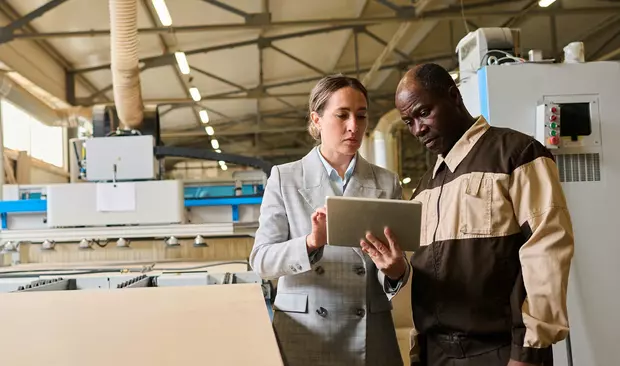How going mobile can help on the shop floor

If you work on the shop floor, you know how important it is to have quick and easy access to your ERP system. PCs have been commonplace on the shop floor since the 1980’s, but tablets not only replicate their functionality in a smaller, sleeker footprint but also extend your ERPs reach further than ever. In this blog post, we'll explore some of the reasons how going mobile can help you on the shop floor.
Free up space
The very definition of using a PC requires the user to be sat or stood in front of it. A large screen, keyboard, mouse and perhaps tower case will take up significant real estate on your desk. A tablet is lightweight, doesn’t require the user to be tied to a desk, and doesn’t need dedicated space to be used. During the COVID-19 pandemic it was also more beneficial for staff to use their own tablets, rather than having to share (and cross-contaminate) a PC used by others.
Reduce initial and running costs
In a previous blog on how mobile devices can boost stores productivity we discussed that tablet PCs are cheaper to buy, support and run than their desktop counterpart. The environment on the shop floor can be much harsher than that of other non-office departments, such as stores or despatch. PCs may need to be shielded from oil, swarf, or any other contaminants from your manufacturing processes. A low-cost tablet is at much less risk than a PC, can be further protected with a cheap case, and is also much cheaper to replace. In short, the overall purchase/running costs and risks are significantly reduced. 123Mobile licences are also at a lower cost than desktop licences, connecting more staff directly to ERP.
Improve accuracy and breadth of captured data
At the very minimum, replacing a PC with a tablet should deliver the same functionality, however the move can provide many additional benefits. Apportioning time when working on multiple works orders simultaneously could be tricky with some systems. 123Mobile takes care of this automatically, allowing an operator to clock on and off multiple jobs, with the time spent being apportioned equally across each of them, providing much more accurate timings.
Companies will often use manual paper-based time sheets for recording bookings, tracking how long a job actually takes, but this is time-consuming and prone to error or potential modification by the operator. Logging this in real time, perhaps along with down time with specific reasons, will drastically improve the accuracy and understanding of how long a job took, and why.
Dealing with real-world situations can also be done there and then. If a machine breaks down, the works order can be amended to book onto a different machine. If a job needs to be reworked, a new operation can be added, clearly explaining what happened rather than allocating the existing time to the original operation.
Capturing data on scrapped items can also be more streamlined, with the amount of scrap being logged at the point of scrappage rather than later, when the works order is marked as short. A further benefit here is that as soon as an item is scrapped, MRP can react to this immediately, creating a new works order for the replacement units. This can be particularly useful for items with long manufacturing timescales.
Each of these features alone will make life easier on the shop floor, but combined they significantly change the shop floor culture to one of immediacy – ‘the sooner I log this, the quicker everyone is aware’. Staff will have more trust in the data in front of them, and it will also filter through to more accurate costings and lead times.
Quality standard adherence
Industry quality standards such as ISO9001 require companies to establish and maintain documented information (e.g. quality manuals, procedures, work instructions, etc.). Ensuring that staff have access to the latest versions of documentation is essential, so removing paper from the shopfloor is an obvious first step. Being able to view any documentation from anywhere on the shop floor on a finger-friendly tablet is also a better option than having to travel to a PC where they have to use a mouse instead. Having a camera on board also means that if you are creating a log where pictorial evidence is useful, or need to scan a barcode, you have everything you need in hand.
Physical visibility
Time and attendance reporting is usually a separate process that staff do when they arrive and leave, but this too can be performed on a tablet. A rubber mouldings manufacturer replaced all PCs on the shop floor with tablets, also using them for staff to clock on/off. As their facility was a relatively old factory, with many side offices and corridors, it was extremely useful for the last person to be able to see if everyone else had clocked out for the day before locking up.
Summary
A portable device in-hand provides a much more reactive link between the real world to your ERP system. Performing a transaction at the point at which it occurs ensures that nothing is forgotten, and also provides everyone in the business with instant and more accurate information. With production in a constant state of fluidity, perhaps because of machine breakdowns or other orders taking priority, having a system in place that allows information from the shop floor to be instantaneously available to your entire company makes for a much nimbler business. The fact that this can often be done at a lower cost than a PC-based alternative is an added bonus.